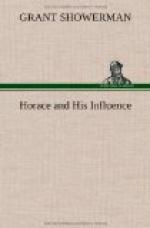The goods of existence must be enjoyed here and now, or never, for all must be left behind. What once is enjoyed is forever our very own. Happy is the man who can say, at each day’s close, “I have lived!” The day is his, and cannot be recalled. Let Jove overcast with black cloud the heavens of to-morrow, or let him make it bright with clear sunshine,—as he pleases; what the flying hour of to-day has already given us he never can revoke. Life is a stream, now gliding peacefully onward in mid-channel to the Tuscan sea, now tumbling upon its swirling bosom the wreckage of flood and storm. The pitiful human being on its banks, ever looking with greedy expectation up the stream, or with vain regret at what is past, is left at last with nothing at all. The part of wisdom and of happiness is to keep eyes on that part of the stream directly before us, the only part which is ever really seen.
Y_ou see how, deep with gleaming snow,_
S_oracte stands, and, bending low,_
Y_on branches droop beneath
their burden,_
A_nd streams o’erfrozen
have ceased their flow._
A_way with cold! the hearth pile high_
W_ith blazing logs; the goblet ply_
W_ith cheering Sabine, Thaliarchus;_
D_raw from the
cask of long years gone by._
A_ll else the gods entrust to keep,_
W_hose nod can lull the winds to sleep,_
V_exing the ash and cypress
aged,_
O_r battling over
the boiling deep._
S_eek not to pierce the morrow’s
haze,_
B_ut for the moment render praise;_
N_or spurn the dance, nor
love’s sweet passion,_
E_re age draws
on with its joyless days._
N_ow should the campus be your joy,_
A_nd whispered loves your lips employ,_
W_hat time the twilight shadows
gather,_
A_nd tryst you
keep with the maiden coy._
F_rom near-by nook her laugh makes plain_
W_here she had meant to hide, in vain!_
H_ow arch her struggles o’er
the token_
F_rom yielding
which she can scarce refrain!_
iii. LIFE AND MORALITY
But Horace’s Epicureanism never goes to the length of Omar’s. He would have shrunk from the Persian as extreme:
“YESTERDAY This Day’s Madness
did prepare,
TOMORROW’S Silence, Triumph,
or Despair,
Drink! for you know not
whence you came, nor why:
D_rink! for you know not why you go, nor
where_.”
The Epicureanism of Horace is more nearly that of Epicurus himself, the saintly recluse who taught that “to whom little is not enough, nothing is enough,” and who regarded plain living as at the same time a duty and a happiness. The lives of too liberal disciples have been a slander on the name of Epicurus. Horace is not among them. With degenerate Epicureans, whose philosophy permitted them “To roll with pleasure in a sensual sty,” he had little in common. The extraction from life of the honey of enjoyment was indeed the highest purpose, but the purpose could never be realized without the exercise of discrimination, moderation, and a measure of spiritual culture. Life was an art, symmetrical, unified, reposeful,—like the poem of perfect art, or the statue, or the temple. In actual conduct, the hedonist of the better type differed little from the Stoic himself.




